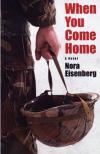When You Come Home
Nora Eisenberg tackles a touchy topic in When You Come Home – specifically, she writes about the mysterious Gulf War illness that afflicted a quarter of returning soldiers from the Gulf War, but, more generally, she explores the damage that soldiers sustain physically and emotionally during wartime.
Nora Eisenberg tackles a touchy topic in When You Come Home – specifically, she writes about the mysterious Gulf War illness that afflicted a quarter of returning soldiers from the Gulf War, but, more generally, she explores the damage that soldiers sustain physically and emotionally during wartime.
In When You Come Home, we follow the tale of two best friends who fought in the Gulf War. The novel opens when Tony returns home, followed soon after by his best friend Homer. Tony quickly falls in love with Lily, a young woman who grew up in his hometown and who was always his best girl friend. Homer returns to his wife Nancy, who becomes pregnant on Homer’s first night home. Life seems like it’s going to return to normal, and the two young men will be able to pursue their dreams of career and family. But when Homer falls ill and doctors can’t explain it, the two men and the women that love them search for meaningful answers, not only to the question of why Homer is sick but also to the question of how to return to civilian life after going through the horrors of war. The transition is horrifying at worst, mediocre at best, and the women are left with the shaky uncertainty of living with men damaged, both physically and spiritually, even while they dream of a better day on the horizon.
This quiet novel about love after war joins a host of classic stories about soldiers and the return to civilian life – stories like “The Red Convertible” by Louise Erdrich or “Soldier’s Home” by Ernest Hemingway. Though at times the narrative jumps too frequently among characters’ points of view, the novel provides a critical glimpse into the psyches of young men engaged in modern warfare. Eisenberg never falters as she walks the precarious line between condemning war and supporting the men and women who fight battles at the behest of the American government and the American people. There has never been a better time to read about these issues and discuss them.





